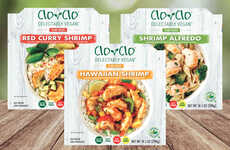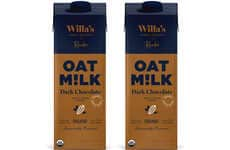
Nestlé Launches Vegan Egg and Shrimp Options Under Garden Gourmet
Niko Pajkovic — October 11, 2021 — Lifestyle
References: nestle & plantbasednews.org
Nestlé has announced the launch of vegan eggs and shrimp, expanding its range of plant-based offerings under its Garden Gourmet brand. According to the company, the two new products, named 'Garden Gourmet VEGGie' and 'Garden Gourmet Vrimp,' were developed by R&D experts at Nestlé Research in Switzerland.
Nestlé's new plant-based egg offering is made using soy protein and can be cooked just like traditional eggs or used as a baking ingredient alternative. Meanwhile, 'Garden Gourmet Vrimp' is made from a unique blend of seaweed, peas, and konjac root. Together, these ingredients offer customers a strong source of dietary fiber 'while mimicking the taste and texture of real shrimp.
“Our longstanding expertise in plants, protein, and nutritional sciences enabled our teams to develop these great innovations in under a year," said Stefan Palzer, Nestlé Chief's Technology Officer, who believes the new plant-based offerings represent some of the brand's finest meat-free alternatives.
Image Credit: Nestlé
Nestlé's new plant-based egg offering is made using soy protein and can be cooked just like traditional eggs or used as a baking ingredient alternative. Meanwhile, 'Garden Gourmet Vrimp' is made from a unique blend of seaweed, peas, and konjac root. Together, these ingredients offer customers a strong source of dietary fiber 'while mimicking the taste and texture of real shrimp.
“Our longstanding expertise in plants, protein, and nutritional sciences enabled our teams to develop these great innovations in under a year," said Stefan Palzer, Nestlé Chief's Technology Officer, who believes the new plant-based offerings represent some of the brand's finest meat-free alternatives.
Image Credit: Nestlé
Trend Themes
1. Plant-based Alternatives - The trend towards creating more plant-based alternatives for traditional meat and seafood products presents disruptive innovation opportunities for the food industry, particularly for companies willing to invest in R&D expertise.
2. Sustainable Sourcing - A growing demand for plant-based foods that do not harm aquatic ecosystems presents opportunities for manufacturers who can sustainably source ingredients to create environmentally friendly plant-based seafood products.
3. Convenience Foods - The rise in plant-based convenience foods that can be cooked quickly and used as baking alternatives offers innovation opportunities for food companies that can develop such products without compromising taste, texture, and nutritional value.
Industry Implications
1. Food Manufacturing - Food manufacturers can capitalize on the growing demand for plant-based foods by investing in R&D to develop sustainable, nutritious, and tasty plant-based alternatives for traditional meat and seafood products.
2. Retail - Retailers who offer a variety of high-quality plant-based alternatives to traditional meat and seafood products could see increased sales and customer loyalty, particularly among health-conscious and environmentally aware consumers.
3. Foodservice - Foodservice companies that incorporate plant-based alternatives into their menus could attract new customers while also catering to those with dietary restrictions or preferences.
2.7
Score
Popularity
Activity
Freshness























